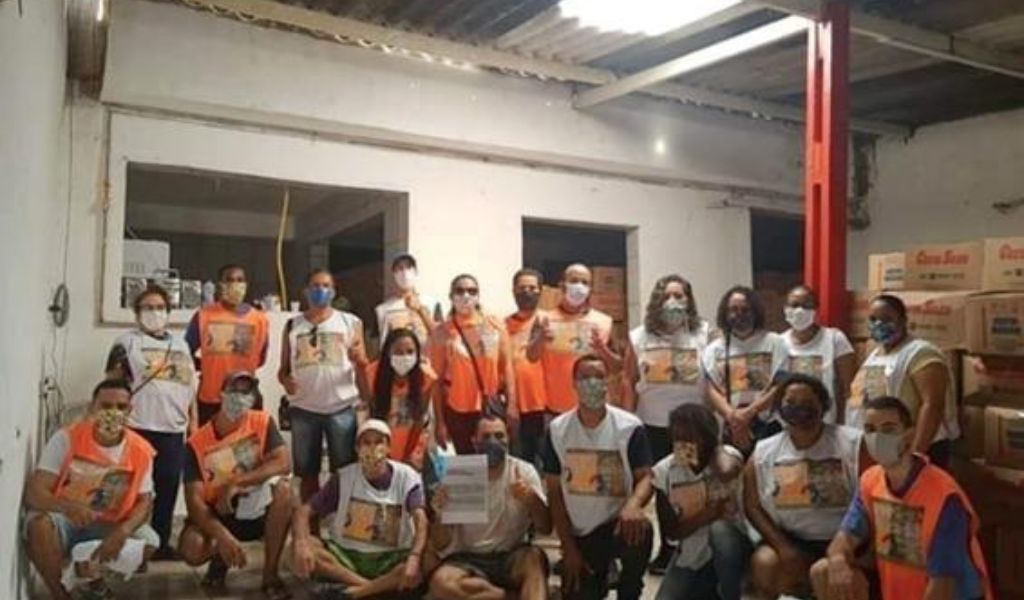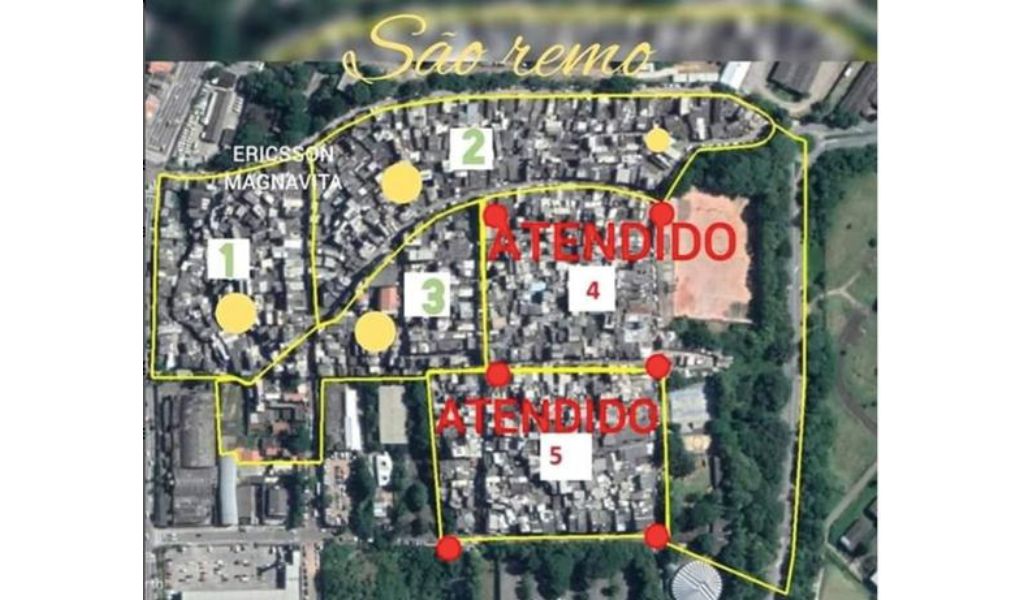Across São Paulo several grassroots social innovations emerged as response to the crises produced or aggravated by the Covid-19 pandemic. In addition to food distribution, which played a crucial role in reducing food insecurity in most communities, the intersectoral coordination of initiatives beyond food was key as seen in the work of the ‘São Remo Collective Against Covid’.

When the pandemic first arrived in Brazil, many residents of favelas and urban peripheries were at a loss, not knowing what to do. On the one hand, Brazil had a denialist president who said that Covid-19 was nothing more than a “little flu or a little cold”. On the other hand, epidemiologists, doctors, and part of the mainstream press sought to make the population aware of the risks and the importance of maintaining social distancing, mask wearing, and adopting new hygiene habits. During this informational crossfire, the fear of being contaminated and dying or losing a loved one took a few months to spread.
The economic impact was much more immediate, and many of those who lived in the peripheries and slums quickly lost their jobs, saw their business income fall, or the demand for their services decreasing considerably. In this scenario, civil society organisations that had been active in these regions for a long time began to mobilise to support residents, as was the case of the São Remo favela.
Part of a series: read the first blog here
São Remo
The São Remo favela is in Butantã, in the West Zone of the city of São Paulo, next to the main campus of the University of São Paulo (USP). Because it is in a middle-class neighbourhood and close to one of the most important centres of knowledge production in Latin America, the favela has always been the target of social projects developed by students, professors, and residents in partnership with the government and national and international philanthropic entities. One of these projects is Alavanca Brasil, which had been working since 2004 mainly in tutoring children and young people in the community.
Right at the start of the pandemic, Alavanca received a donation to purchase food for the residents of the favela. Rather than simply buy and distribute food, their members decided to invite all leaders of local organisations to form the “São Remo Collective Against Covid” and coordinate actions to face the pandemic and its consequences. In agreement across all local organisations, the first round of food was purchased from the Landless Workers’ Movement and prioritised single mothers and people with chronic diseases.
Other external support arrived throughout 2020, with donations of hygiene items, food, and money and organising information and awareness campaigns for residents on preventive health measures. But it was a partnership with the Butantan Institute that changed the level of the action promoted by the Collective. The Institute – Latin America’s largest producer of vaccines and serums and neighbouring the favela – sought out local leaders to develop a pilot project for mass testing of the population. In addition to testing, isolating and guiding people who might be contaminated, Butantan carried out a process of identification and registration of people with vulnerabilities to establish a model of action in other communities. In return for the support of local entities and leaders, the Institute donated basic food baskets to all families in the community throughout out 2020 and 2021.
Universalising food distribution and reducing Covid infections
The successful universal distribution of food baskets in São Remo happened for three reasons: the main leaders and organisations were working together in the Collective (local coordination); there was a census conducted a few years earlier by USP’s Institute for Advanced Studies (IEA-USP), residents and other public and private institutions (data available on beneficiaries); and Alavanca volunteered to be the legal entity registered with a regularised CNPJ responsible for receiving donations, since the Residents’ Association were having problems registering (legalised entity).

When the first batch of donations arrived on 9th April, they soon realised they needed to organise the logistics of distribution so that no family was left behind nor there was an overlap of donations. With the experience of conducting a census as well as their local knowledge, leaders divided the streets of the favela into quadrants and went house to house distributing tickets which would be exchanged for food baskets at the headquarters of the Residents’ Association. Visiting houses allowed local leaders to discover problems hidden in the community until then, such as people with mobility difficulties, bedridden, with chronic illnesses, cases of depression and anxiety unmet by other social actions. Whenever necessary, the leaders themselves sought to refer these people to the public health services.
The Collective also promoted an education campaign on Covid-19 regarding the prevention actions that the community could adopt in partnership with the Preta.ID collective, a project formed by black students from the USP School of Medicine that focused on the Health of the Black Population in the context of the pandemic. Finally, to protect residents from Covid while simultaneously generate income for some families, Alavanca organised seamstresses from the community to make protective masks, and then distributed them throughout the favela.
Sadly, as donations began to dwindle frictions emerged within the collective: accusations that some residents were being privileged based on their personal relationships with the leaders or that the decisions made were more focused on showing impact rather than effectiveness arose from several sides. In the face of these disagreements and the improvement in the pandemic situation, the collective fell apart. A new group was then formed, the Collective São Remo Connection, composed of a smaller number of organisations and individual leaders. Still, the universality of access to social assistance prevented clientelist practices.
The experience of universal food assistance and intersectoral coordination of initiatives was made possible by the combination of factors such as the local legitimacy of community leaders, technical knowledge of the socioeconomic situation of families, external financing from public and private partners, and the coordination of leaders in a collective. Even though it was relatively short, the experience of the São Remo Collective Against Covid leaves important lessons for social projects and public policies that target the population living in favelas and urban peripheries.
